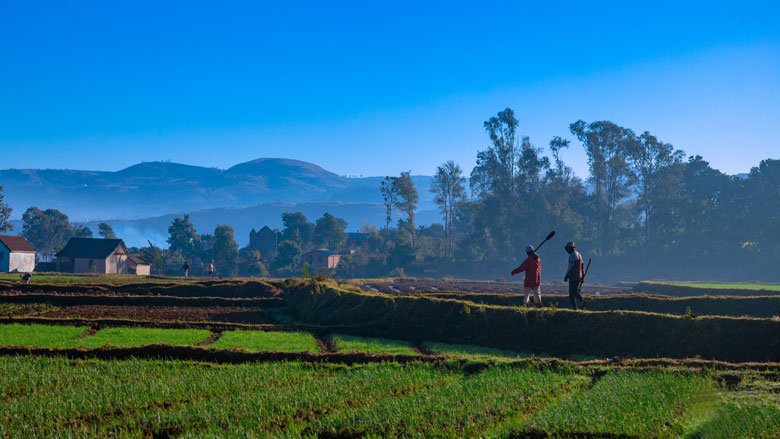
Farmers working their fields in Madagascar. Photo: Tsiky Natia / World Bank
The World Bank Group (WBG) endorsed a new Country Partnership Framework (CPF) for Madagascar for 2023 to 2027 to support the country’s efforts towards inclusive and resilient growth.
The strategy will be carried out by the WBG’s member organizations, which include the World Bank, the International Finance Corporation (IFC), which focuses on the private sector in emerging markets, and the Multilateral Investment Guarantee Agency (MIGA), which offers political risk insurance and credit enhancement guarantees.
This CPF follows the World Bank Group’s long-term commitment to Madagascar and through this new partnership strategy, we hope to be able to further support the country in increasing its growth over the long term through building up human capital and physical assets while strengthening resilience to shocks to exit the country out of the poverty trap.

Closely aligned with the main findings of the Systematic Country Diagnostic (SCD) Update and underpinned by the Madagascar Country Private Sector Diagnostic (CPSD), the new CPF will focus on three high-level outcomes:
1. Improving job opportunities through transformative action
Madagascar must increase economic opportunities to create jobs and increase incomes. The new CPF will support Madagascar’s effort to achieve this goal by:
- Scaling up selected value chains: The Integrated Growth Pole Series of projects will provide direct support to key sectors (including tourism, agribusiness and digital) with high potential for growth and employment generation, while providing a platform to support policy dialogue and improvements in the investment climate. The sectors will also benefit from IFC investments and technical support and further leverage the private sector to enhance sustainable growth. IFC will support the post-COVID19 recovery and scale up selected value chains, with a focus on agriculture and agribusiness (e.g., vanilla, livestock), light manufacturing (e.g., textiles), and complementary efforts to enable financial services and credit infrastructure, as well as support investment opportunities that promote greater intra-regional integration and South-South trade. IFC will also support microfinance institutions to boost access to digital financial services, including through mobile money services, to deepen financial inclusion and support economic activity. MIGA will seek to leverage its political risk guarantees to mobilize foreign private investment in support of a green, resilient, inclusive post-pandemic recovery, focusing on sectors with high potential development impact (e.g., tourism, agribusiness) and projects with climate benefits.
- Strengthening foundations for the digital economy: The WBG will continue to support the government to implement deep, accelerated sector reforms toward liberalization of the digital infrastructure, independent and effective sector regulation, and private sector participation. The WBG will also encourage development of an emerging digital start-up ecosystem by supporting incubation of new digital enterprises and building capacity of supporting stakeholders (incubators, accelerators, universities). IFC and MIGA will aim to support greater private sector participation in other segments of the telecommunication’s sector (e.g., facility-based Internet service providers).
- Improving access to basic infrastructure services: Given the large investments needs, the CPF will undertake spatial prioritization, based on promising value chains and domestic regional competitive advantage that can improve and stabilize rural livelihoods, boost the competitiveness of the country, and create new opportunities in services while enhancing food security and resilience to climate change.
2. Improved Human Capital Outcomes
Investing in human capital is central to Madagascar’s future. In this CPF cycle, priority interventions will aim at:
- Increasing access to quality education and health services: Engagement will be expanded with a focus on hard-to-reach populations and adaptable systems such as pandemic preparedness, early childhood development, and quality of (and access to) education, including access to improved services such as water, sanitation, and hygiene, and electricity. Public financial management will also be a key focus. In education, where outcomes are regressing, the World Bank will support the government in reversing these trends through interventions already underway focused on early childhood and learning outcomes; the critical role of teacher quality; and greater use of evidence-based approaches, including greater use of digital approaches to help teachers improve quality and reach a wider audience.
- Promoting women’s and girls’ empowerment: The CPF will focus on increasing access to gender-based violence (GBV) support services; the number of girls who transition to secondary school, especially in rural areas; and access to contraception.
- Improving food security systems and reducing stunting: Interventions will be based on multisectoral approaches with behavior change support. This will be done mostly through the next phases of the nutrition multiphase programmatic approach, which has already shown remarkable success in reducing stunting in Madagascar. It will also be done by ensuring that all future agricultural sector projects are nutrition sensitive, and that water, sanitation, and hygiene projects take prevalence of stunting and diarrheal diseases into account for targeting, and through links to social protection schemes promoting nutrition.
3. Enhanced Resilience Against Shocks
Madagascar faces the full spectrum of shocks and requires systems that can mitigate risks and develop resilience to limit losses to the socioeconomic well-being of citizens. This new five-year CPF will aim at (i) increasing fiscal space for economic resilience through public financial management reforms, (ii) strengthening disaster risk management by adopting a regional, multisectoral, subnational, and spatially integrated approach, (iii) improving social protection and livelihoods support with a focus on better targeting, entry and graduation criteria, national ownership, sustainability, economic inclusion, and jobs, and (iv) improving natural resource management by scaling up and mainstreaming integrated and participatory landscape and seascape management investments.
